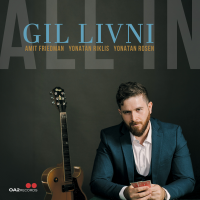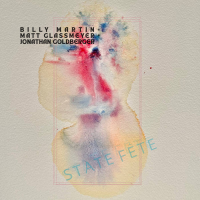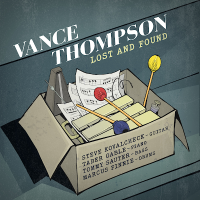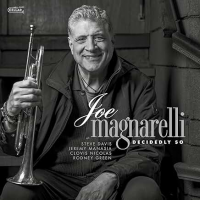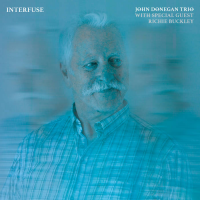Home » Jazz Articles » Multiple Reviews » Verve's Free America Series, Part 3-3
Verve's Free America Series, Part 3-3
 Archie Shepp
Archie Shepp
Black Gipsy
Verve/Free America
2005
Archie Shepp's Black Gipsy points to an ongoing preference on the part of the saxophonist for larger ensembles as the 60s ground to a close. Fronting a nonet of both influential and unexpected colleagues, he hangs up his usual tenor and focuses solely on soprano. The band presents a motley crew and includes fellow fire breathers like altoist Noah Howard and violist Leroy Jenkins along with now-forgottens like harmonica player Julio Finn. Vocalist Chicago Beau shares album jacket honors and contributes to the scripting of the two sprawling original album cuts. Shepp's primary preoccupations are all present: a deep-seated sense of the blues, Pan-Africanism, a dramatic theatricality to arrangements, dense instrumental polyphonies, poetic manifesto-style chants, and so on. The title piece short-sightedly relegates drummer Sunny Murray to the ill-fitting role of time-keeper. But on the plus side it features brilliant arco string play by Jenkins and bassist Earl Coleman and an incisive Arabic-tinged solo by trumpeter Clifford Thornton. Pianist Dave Burrell's dark block chords buttress as additional harmonic fulcrum. Shepp routinely emphasizes texture, color and density rather than a succession of declamatory lead voices and the deference to an organic ensemble politic generates a welcome communal atmosphere in the music. Intent couches more in emotional import and expression than flawless execution. The somber emphatic mood sustains even when certain instruments meander and slip. Side Two's travelogue "Epitaph of a Small Winner tracks a similar strategy of wobbly polyphony across a shifting rhythmic chassis as the band paints aural portraits of Rio, Casablanca and Chicago. A rundown of Cal Massey's rondo melody "Pitchin' Can rounds the disc out as coda. While not among the upper echelon in Shepp's oeuvre this heartfelt concoction of African American cultural capital still contains plenty of strong musical medicine.
 Alan Shorter
Alan Shorter
Tes Estat
Verve/Free America
2005
Brother to Wayne, Alan Shorter suffered a career fate similar to that of Tommy Turrentine another older sibling of an influential saxophonist. A significant source of his anonymity stemmed from a difference in talent, a reality manifested on his only America session Tes Estat. Shorter's first album Orgasm (Verve) benefited from a stellar supporting cast. This date isn't quite on par, but he does employ some potent talent toward the cause. Tenor saxophonist Gary Windo dominates "Disposition siphoning such a typhoon through his reed that the ligatures and keypads can almost be heard buckling under the strain. His solo erupts with enough atomic energy to shatter windows right along with eardrums; it's a turn that would make even devout reed-detonators Karou Abe and John Zorn take pause. Shorter wisely opts for a less apoplectic approach, firing off trilled salvos that retain a brassy bite. At twenty-seven minutes all told it must have made for a lopsided LP. Bassist Johnny Dyani, who also doubles on flutes and surprisingly prevalent piano, and drummer Rene Augustus auger even more prominent space on the album's two remaining cuts: "Beast of Bash and "One Million Squared. Windo, who sounds like he blew several gaskets on the opener, takes a more measured and restrained stance on these later pieces. Shorter ends up somewhat peripheral too, an odd occurrence considering the position of his surname at the top of the masthead. Shorter's personal demons and addictions precluded further forays in the driver's seat, but this artifact remains as an edifying clue as to what might have been had he managed to soldier on in the music.
 Clifford Thornton
Clifford Thornton
The Panther and the Lash
Verve/Free America
2005
Clifford Thornton was another brass player whose opportunities to record as a leader were relatively few. But in Thornton's case relative talent had nothing to do with it. His command of trumpet, cornet and valve trombone was at once formidable and inclusive. For The Panther and the Lash he employs the latter two instruments along with shenai, piano and maracas. A 'rhythm section' of uncommon power, pianist Francois Tusques, bassist Beb Guérin and drummer Noel McGhie complete the quartet recorded in concert on a Parisian stage in 1970. Tusques and Thornton divide compositional duties and the band also interprets two traditional African songs. All are of a piece, bleeding one into the next without pause, and a strong thread of regal melody and lyricism binds them together into an winsome whole. The leader's black power sympathies find explicit voice in both the album's title and its first cut "Huey is Free performed in honor Black Panther Party potentate Huey P. Newton. Resplendent in conception and enactment the piece hinges on anthemic cornet work from Thornton, both muted and open and an unerring rhythmic veracity. His colleagues show no semblance of slouch either, bolstering his rich lead lines with limber and acutely-attentive support. Tusques in particular evinces just as much improvisatory clout and energy as his employer, fingers coaxing blinding carpal- punishing figures from keys. The other pieces map similar successful tracts from the shenai-fueled Middle Eastern meets funk syncopations of "El Fath to slippery trombone/piano groove of "Right On! Of the fifteen titles in the Free America series, this one stands unequivocally as the sans pareil.
 Mal Waldron & Steve Lacy
Mal Waldron & Steve Lacy
Mal Waldron with the Steve Lacy Quintet
Verve/Free America
2005
Steve Lacy's second America session was actually jointly-led affair with pianist Mal Waldron sitting in with the soprano saxophonist's working quintet. Waldron and Lacy's musical relationship dates back to the latter's 1957 debut a leader on Prestige. Both men shared an abiding affection for Monk and highly individualized, but sympathetic approaches to improvisation. The friends moved in different circles for many years before reuniting in Paris for this 1972 conclave. Waldron nestles into the niche afforded him as if the time apart were mere days not decades. Adjusting quickly, he adapts his own angular, rhythmically-ripe style to ensemble's preexisting propensities for pointillism. Lacy accords a similar esteem and catalytic tensions play out beautifully in purely musical terms. Cellist Irene Aebi (also heard here as vocalist) bassist Kent Carter and drummer Noel McGhie finalize the fit without compromising their defacto authority to sculpt the music as equals. Potts and Lacy divide into easily discernable stereo channels with the leader occupying the left. Waldron's "Vio occupies an entire side, a long form suite that alternates sections of tumultuous telegraphing rhythms and improvisation with lyrical interludes by the band minus the horns. The pianist dictates the grand tectonic shifts with a keen ear and touch and his colleagues respond in kind. Lacy contributes "Jump for Victor and "Blue Wee, each pivoting on jaunty signature motifs that harbor Monkian overtones of jittery repetition and ratcheted suspense. Alternate takes of "Vio and "Jump for Victor expand the original album's running time by a value-added twenty minutes.
 Frank Wright
Frank Wright
Uhuru Na Umoja
Verve/Free America
2005
Last in the Free America series, Frank Wright's Uhuru Na Umoja, a flashpoint snapshot of his 1970 quartet, is also among the most easily enjoyable and accessible. Altoist Noah Howard is positively incandescent in the second horn slot, both spurring and dovetailing the leader's lines in a rousing display of reed-spoken prowess. Their combined attacks on tracks like the fulminating "Oriental Mood and "Grooving where huge honking slabs of saxophonics topple like dominos against a constantly replenishing rhythm are frequently breathtaking in their fervor and beauty. Bobby Few holds court on keys and wildcard draw Art Taylor, veteran of countless bop to hard bop dates, unexpectedly occupies the drum chair. Taylor acclimatizes to the freer leanings without skipping a beat, his puissant press rolls and cymbal showers maintaining an oceanic fluidity that magnifies the band's spiritualized temperament. The absence of a formal bass presence is hardly a handicap. The five riff-ignited tunes emphasize hard ecstatic blowing. They supply plenty of room for the horns to braid and joust in hoary exultation that often ascends to spiraling heights. Few's rich rolling chords work in league with Taylor's traps to keep the interplay grounded in structure with melody always on the horizon if not within constant reach. There's time for mellifluous, even downright sentimental turns too as on the elegant "Aurora Borealis where Few's gilded right hand ripples eddy gregariously with a tide of tinkling bells and cymbals. Here Wright finds impromptu inspiration to hoist his harmonica and toot along with Howard's lush alto soliloquy. The eidolon of Coltrane hangs heavily and protectively in the air.
Discuss Verve's Free America Series at the AAJ Bulletin Board.
Tags
PREVIOUS / NEXT
Support All About Jazz
 All About Jazz has been a pillar of jazz since 1995, championing it as an art form and, more importantly, supporting the musicians who make it. Our enduring commitment has made "AAJ" one of the most culturally important websites of its kind, read by hundreds of thousands of fans, musicians and industry figures every month.
All About Jazz has been a pillar of jazz since 1995, championing it as an art form and, more importantly, supporting the musicians who make it. Our enduring commitment has made "AAJ" one of the most culturally important websites of its kind, read by hundreds of thousands of fans, musicians and industry figures every month.









